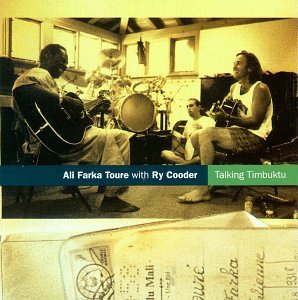Music |
Ali Farka Toure
By
Published: Nov 06, 2022
Category:
World
When Ali Farka Toure died in 2006, all Mali wept. This was a giant — he took his country’s music and blended it with the American blues of the Deep South to produce CDs of piercing originality and astonishing beauty.
Aki Farka Toure was born in a small town 50 miles from Timbuktu. His family was large; he had no formal schooling. From an early age, he worked the land, and it was the land that was his first and best teacher. On the farm, he learned not just the usefulness of his labor, but the magic — although he was a Muslim, he believed also in spirits who live beneath the surface of the River Niger and control both cosmic destiny and mundane reality.
His grandmother was a priestess in "spirit ceremonies." He attended often, and fell under the spell of the music. At 12, he made his own guitar. Years later, he heard American blues masters, notably John Lee Hooker. He could hear the farm in Hooker’s music, he could smell the dirt. The marriage between Africa and America was inevitable — the music Ali Farka Toure invented is now called "desert blues." Watch a video.
This music, even at its most aggressively joyous, is always delicate. This seems wrong. Ali Farka Toure was huge, and in his flowing robes, almost biblical in appearance. He had the pride of a man who worked with his hands — he always listed his occupation as "farmer." But those big hands could pluck notes that quieted the air, even as his rhythms set your feet moving. Clapton, King, Hooker — they’ve got nothing on this guy. Watch a video.
Fame came several times, most recently when Ry Cooder — the American guitarist responsible for Buena Vista Social Club — recorded a CD of duets with him. “Talking Timbuktu” stayed at the top of the World Music charts and won a Grammy. Ali Farka Toure’s response was to go home. Watch a video. [To buy the CD of ‘Talking Timbuktu’ from Amazon, click here. For the MP3 download, click here.]
His neighbors elected him mayor. He spent his music royalties to dredge the river and irrigate the fields; when pressed, he recorded in a slapped-together studio powered by a portable generator. His 40-acre farm, his 11 children and his community came first. "If I eat, they eat," he said. "What I drink, they drink. What I wear, they wear. And I live with the river all the time." Watch a video: Ali Farka Toure and Boubacar Traore.
I’m a major fan of “The Source” and “Ali Farka Toure.” These are bright collections of songs about “education, work, love and society” — not that you’ll understand a word of it. You’ll have no trouble, though, falling in love with the sound, the sheer musicality of his playing. The foot-stomping rhythm. The mind-bending guitar runs. And that down home, country voice. [To buy the MP3 of ‘Ali Farka Toure’ from Amazon, click here. To buy the CD of “The Source,” click here.]
“For some people, Timbuktu is a place at the end of nowhere," Ali Farka Toure said. "But that’s not true. I’m from Timbuktu, and I can tell you that it’s right in the center of the world." The center of World Music, in any event. By the river where he learned to play like a god.


